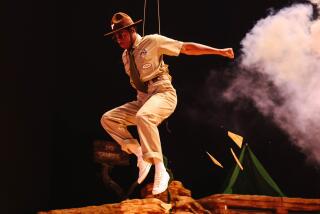Jazz Review : Shorter Gets Serious With New Septet at Coach House
- Share via
No single musician embodies the mainstream-jazz versus jazz-fusion controversy as does Wayne Shorter. When his first album in eight years was released earlier this month, those who love his acoustic recordings of the ‘60s with Art Blakey, Miles Davis and his own groups hoped that the first truly original saxophonist to emerge from the influence of John Coltrane would seek the spirit, if not the form, of those landmark years.
They shouldn’t feel betrayed. Though the first public performance from his new septet at the Coach House on Thursday would have disappointed purists with its electric orchestration and backbeat, Shorter showed a rigorous determination to keep his music serious, with both challenging compositions and meaningful, animated improvisations.
The saxophonist’s album, “High Life,” is a thematic, many layered document that, at times, includes 30 members of the Los Angeles Philharmonic and as many as six percussionists. With a total supporting cast of six on the Coach House stage, Shorter managed to replicate the depth, if not the percussive density, of the album.
While there were some rough ensemble moments, they served to give the performance a more natural feel than heard on the album, even as musicians played while shuffling through sheaves of sheet music. Listeners needed to follow closely as well. Even the most simplistic themes took unpredictable turns, often going to unexpected places.
Shorter took advantage of the more predictable backdrops to develop inviting solos, filled with lines that surged and lifted skyward. His soprano tones were round and supple, and strung together in dynamic style. His tenor play was assertive and robust, without cheap appeals to emotion. Something magical happened every time he took to the horn.
Only the rhythms, despite fine percussion accents from Frank Colon, seemed to fall shy of its leader’s intent. A crisper, more ambitious attack from drummer Will Calhoun would have driven the music in the way it demanded. Only the variations Shorter has written into the material kept the pace from becoming tedious.
In a moment of irony, Shorter directed his ensemble through a barely recognizable version of “Sanctuary,” the ambitious composition he wrote for Miles Davis’ 1969 recording “Bitches Brew.” While that album is frequently credited with launching the fusion movement, “Sanctuary” was its least predictable piece. Though the form may have changed, Wayne Shorter has not lost the fire.
By contrast, opening act, trumpeter and film-composer Mark Isham (“Nell,” “A River Runs Through It”), playing in a more traditional combo format, glowed rather than burned. His cool, often moody numbers seemed coolly polished in comparison, as the trumpeter displayed an intriguing, if conservative, way with his horn.
* The Wayne Shorter Septet plays the House of Blues, 8430 Sunset Blvd., Wednesday, 8:30 p.m. The Mark Isham Band opens. $25. (213) 650-1451.
More to Read
The biggest entertainment stories
Get our big stories about Hollywood, film, television, music, arts, culture and more right in your inbox as soon as they publish.
You may occasionally receive promotional content from the Los Angeles Times.










